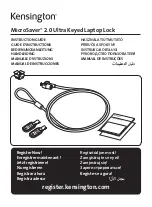
Communication Functions
4-10
4
Encryption
The computer provides the following encryption mechanisms including: TKIP, AES,
and WEP. The three techniques allow you to encrypt data to be transmitted, which
will make illegal interception more difficult.
•
To use the WEP functions, your communication partner must support
the functions.
•
To utilize TKIP, the access point which you are using must support
TKIP.
•
To utilize AES, the access point which you are using must support AES.
•
WEP (Wired Equivalent Privacy)
WEP relies on an encryption key that is shared between a wireless device and an
access point. The key is used to encrypt data and decrypt the transmitted data.
•
The computer supports 128-bit and 64-bit WEP keys.
•
For enhancement of security, the encryption keys should be
periodically changed.
•
TKIP (Temporal Key Integrity Protocol)
TKIP provides an improved data encryption, which was weak in WEP. The TKIP
encryption automatically generates a new unique encryption key periodically for
each device to avoid the same key staying in use for weeks as they do with WEP.
•
AES (Advanced Encryption Standard)
AES is a stronger form of encryption than is found in the WPA protocol and is the
security standard approved by US Government organizations.
Summary of Contents for Actius PC-MC22
Page 48: ...Basic Operations 1 24 1 ...
Page 112: ...Setup Utility 5 8 5 ...
Page 136: ...Appendixes A 24 Appendixes ...
















































